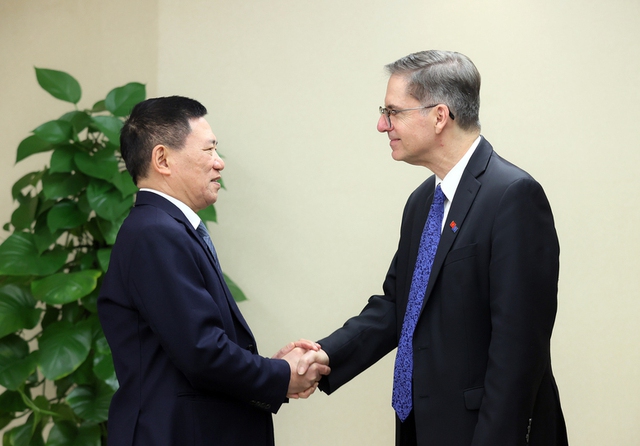Deputy PM proposes stronger WB–Viet Nam cooperation in strategic sectors
VGP - Deputy Prime Minister Ho Duc Phoc called on the World Bank (WB) to deepen cooperation with Viet Nam across a range of priority sectors, particularly strategic infrastructure, clean energy, urban development, digital transformation, and climate adaptation.

Deputy Prime Minister Ho Duc Phoc (L) and WB Vice President for the East Asia and Pacific (EAP) Region Carlos Felipe Jaramillo in Ha Noi, November 25, 2025 - Photo: VGP/Tran Manh
The proposal was made on November 25 during his meeting with Carlos Felipe Jaramillo, the WB Vice President for the East Asia and Pacific (EAP) Region.
Ho urged the WB to expand support for Viet Nam in areas where it holds comparative advantages and Viet Nam has urgent development needs, including logistics, data governance, and major infrastructure projects. He also proposed further cooperation on official development assistance (ODA) and concessional loans through new development finance instruments, especially for transport infrastructure and coastal resilience.
He requested that the WB to continue implementing climate-related loans using a "climate co-benefits" approach, thereby enhancing resilience and green growth in vulnerable regions.
Ho noted that Viet Nam will soon embark on a series of major projects and hopes to continue effective collaboration with the WB in transport infrastructure, energy, digital transformation, and climate change adaptation. He asked Vice President Jaramillo to continue supporting Viet Nam and to work closely with the WB Country Director to advance shared priorities and ensure the effective rollout of cooperative initiatives.
Appreciating Viet Nam's development journey and forward-looking strategies, Jaramillo suggested the country accelerate administrative reforms, reduce processing time, mobilizing capital through public–private partnerships, and invest in science, technology, and innovation-driven projects.
The two sides also discussed pressing climate challenges such as erosion, subsidence, saltwater intrusion, and flooding in the Mekong Delta and Ho Chi Minh City and the implementation of the major initiative to develop one million hectares of high-quality, low-emission rice linked to green growth in the Mekong Delta, as well as financing solutions for private enterprises investing in wind, solar, and mining projects.
The WB has been one of Viet Nam's largest development partners since 1993. By the end of 2024, it had supported Viet Nam with 180 programs and projects worth over US$26 billion, including about US$23 billion in loan agreements. These initiatives have played a significant role in Viet Nam's socio-economic development, particularly in transport infrastructure, and have provided technical assistance in treasury and banking reforms. Stronger cooperation is expected to help Viet Nam mobilize vital resources for sustainable, inclusive development in the coming years./.

